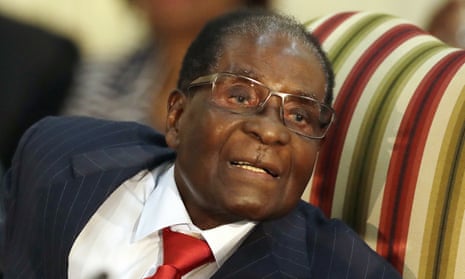The World Health Organization has removed the Zimbabwean president, Robert Mugabe, as a goodwill ambassador following outrage among donors and rights groups at his appointment.
The WHO’s director general, Tedros Adhanom Ghebreyesus, who made the appointment at a high-level meeting on non-communicable diseases (NCDs) in Uruguay on Wednesday, said in a statement that he had listened to those expressing concerns.
“Over the last few days, I have reflected on my appointment of His Excellency President Robert Mugabe as WHO goodwill ambassador for NCDs in Africa. As a result I have decided to rescind the appointment,” Tedros said in a statement posted on his Twitter account @DrTedros.
The WHO boss had faced mounting pressure to reverse the decision, including from some of the leading voices in global public health.
Please see my statement rescinding the appointment of a Goodwill Ambassador for NCDs in Africahttps://t.co/dyxFzNAFqk
— Tedros Adhanom (@DrTedros) October 22, 2017
Several former and current WHO staff said privately they were appalled at the “poor judgement” and “miscalculation” by Tedros, elected the first African head of WHO in May.
Mugabe was head of the African Union (AU) when the bloc endorsed Tedros - a former health and foreign minister of Ethiopia - over other African candidates for the top post, without any real regional contest or debate, they said.
Mugabe, 93, is blamed in the West for destroying Zimbabwe’s economy and numerous human rights abuses during his 37 years leading the country as either president or prime minister.
Britain said Mugabe’s appointment as a goodwill ambassador for non-communicable diseases in Africa was “surprising and disappointing” and that it risked overshadowing the WHO’s global work. The United States, which has imposed sanctions on Mugabe for alleged human rights violations, said it was “disappointed.”
“He (Tedros) has to remember where his funding comes from,” said one health official who declined to be identified.
In announcing the appointment, Tedros had praised Zimbabwe as “a country that places universal health coverage and health promotion at the centre of its policies to provide health care to all”.
But multiple critics noted that Mugabe, who is 93 and in increasingly fragile health, travels abroad for medical care because Zimbabwe’s health care system has been so severely decimated.
The US ambassador to the United Nations during Barack Obama’s administration, Samantha Power, tweeted: “The only person whose health 93-yo Mugabe has looked out for in his 37 year reign is his own.”
Zimbabwe’s main opposition MDC party had called the appointment “laughable” and “an insult”.
The US administration of President Donald Trump, which is already questioning financial support for some programmes of United Nations agencies, is WHO’s largest single donor.
The controversy came as WHO struggles to recover its reputation tarnished by its slowness in tackling the Ebola epidemic that killed more than 11,000 people in West Africa from 2014-2015 under Tedros’ predecessor Margaret Chan.
The Geneva-based agency is currently grappling with crises including a massive cholera outbreak in Yemen that has infected some 800,000 people in the past year and an outbreak of plague in Madagascar that has killed nearly 100 people in two months.
Combatting chronic diseases such as diabetes and heart disease linked to smoking, obesity and other risk factors are part of its permanent global agenda.
